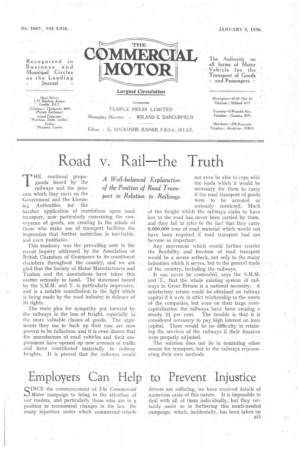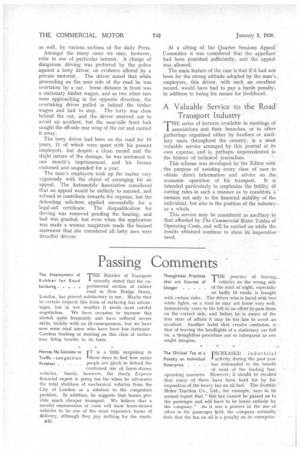Employers Can . Help to Prevent Injustice QINCE the commencement of
Page 21

Page 22

If you've noticed an error in this article please click here to report it so we can fix it.
The Commercial Motor campaign to bring to the attention of our readers, and particularly those. who are in a position to re-commend changes in the law, the many injustices under wItich commercial-vehicle drivers are suffering, we have received details of numerous cases of this nature. It is impossible to deal with all of them individually, but they certainly assist us in furthering this much-needed campaign, which, incidentally, has been taken up as well, by various sections of the daily Press. Amongst the many cases we may, however, refer to one of particular interest. A charge of dangerous driving was preferred by the police against a lorry driver, on evidence offered by a private motorist. The driver stated that while proceeding on the near side of the road he was overtaken by a car. Some distance in front was a stationary timber wagon, and as two other cars were approaching in the opposite direction, the overtaking driver pulled in behind the timber wagon and had to stop. The lorry was close behind the car, and the driver swerved out to avoid an accident, but the near-side front hub caught the off-side rear wing of the car and carried it away.
The lorry driver had been on the road for 15 years, 11 of which were spent with his present employers, but despite a clean record and the slight nature of the damage, he was sentenced to one month's imprisonment, and his licence endorsed and suspended for a year.
The man's employers took up the matter very vigorously with the object of arranging for an appeal. The Automobile Association considered that an appeal would be unlikely to succeed, and refused to contribute towards the expense, but the defending solicitors applied successfully for a legal-aid certificate. The disqualification for driving was removed pending the hearing, and bail was granted, but even when the application was made a woman magistrate made the biassed statement that she considered all lorry men were dreadful drivers. At a sitting of the Quarter Sessions Appeal Committee it was considered that the appellant " had been punished sufficiently, and the appeal was allowed.
The main feature of the case is that if it had not been for the strong attitude adopted by the man's., employers, this driver, with such an excellent record, would have had to pay a harsh penalty, in addition to losing his means for livelihood.
A Valuable Service .to the Road' 'Transport Industry
'THE series of lectures available to meetings of I associations and their branches, or to other, gatherings organized either by hauliers or ancillary users throughout the country, is a most valuable service arranged by this journal at its own expense, and is,. perhaps, unprecedented in the history of technical journalism.
This scheme was developed by the Editor with , the purpose of assisting every class of user. ;to obtain direct information and advice on . the economic operation of his transport. It is intended particularly to emphasize the futility of cutting rates in such a manner as to constitute a menace not only to the financial stability of the individual, but also to the position of the industry'. as a whole.
This service may be considered as ancillary to that afforded by The Commercial Motor Tables of Operating Costs, and will be carried on while the results obtained continue to show its imperative' need.




















































































